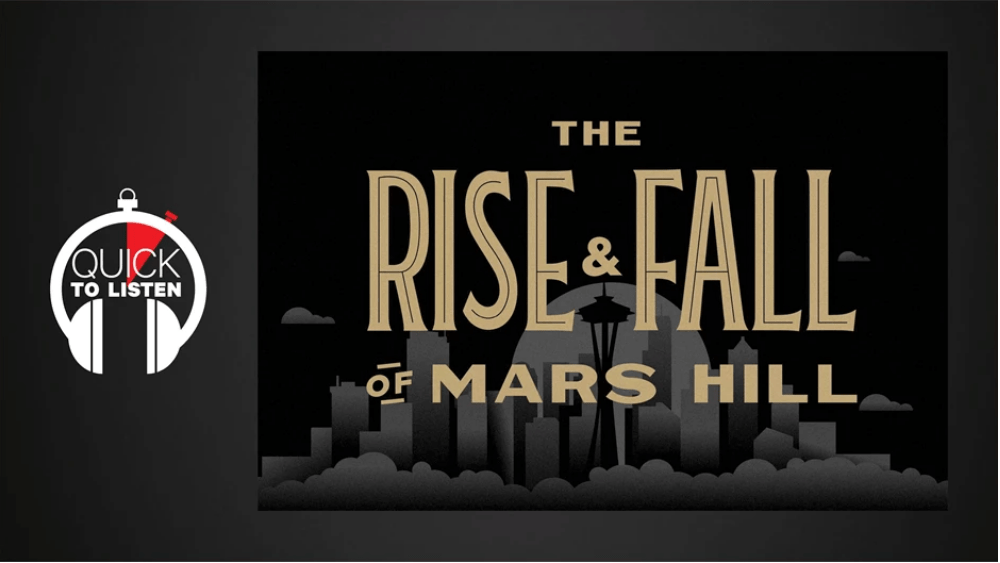The spectacular rise and fall of Mars Hill church has Christians talking again – almost seven years after the Seattle megachurch disintegrated in the wake of founding pastor Mark Driscoll’s resignation.
The Rise and Fall of Mars Hill is a new podcast produced by Christianity Today that takes an in-depth look, from the church’s establishment to collapse.
This is high-quality journalism – a fascinating story that’s been well researched, organised and produced.
“Like all new ‘you have to listen to this’ podcasts I was sceptical. But for once the hype is accurate,” writes David Robertson, who is currently working in Sydney as an evangelist. “I would regard it as almost compulsory listening for any contemporary Western pastor – and indeed any Christian interested in the Church.”
“Let me say that it is mandatory listening for anyone in Christian ministry or thinking about going to the ministry,” says Michael F. Bird, Academic Dean of Ridley Melbourne.
But prominent Christians aren’t declaring the podcast to be a “must hear” simply because it is quality entertainment – the rise and fall of Mars Hill strikes a nerve in us all.
Since Mark Driscoll’s fall from grace at the end of 2014, Christians have experienced the fall of charismatic leaders from almost every part of the church. Some have been theologically conservative, others theologically progressive. Charismatic leaders have been exposed in megachurches and small parishes. Within traditional authority structures of church institutions, and serving in the grassroots of not-for-profit ministries.
The result? We know that abusive Christian leaders and toxic church cultures are not only found “out there”, but can take root in all kinds of churches and Christian organisations. So if there are lessons to be learned from Mars Hill and Mark Driscoll, we all need to learn them.
Just four episodes in, The Rise and Fall of Mars Hill provides an abundance of material for Christians to learn from.
Some lessons are obvious. Like, how a lack of accountability in the church’s governance structures invested too much power in one man. And how church growth can cause good people to overlook their leader’s character deficiencies.
There are more nuanced lessons, too. For example, a lesson about how easily a community’s theology can be shaped by a leader’s personality in certain church contexts – especially those that are independent and not covered by a broader community such as a denomination or movement.
And there is certainly a lesson about how the “industry of Christianity” – the world of endorsements, mainstream Christian media, social media, conference speaking gigs, and book sales – can elevate a person to the point where they are not accountable to anyone.
Of all the lessons revealed in The Rise and Fall of Mars Hill, the most significant are pastoral ones that emerge from the heart-wrenching testimonies of people who were deeply wounded by their experiences with Driscoll at Mars Hill.
“When we ask why this happens, shouldn’t we ask why we keep doing it?” – Mike Cosper
“There is a pile of dead bodies behind the Mars Hill bus,” Driscoll told attendees of a church planters ‘boot camp’ in October 2007. “And, by God’s grace, it will be a mountain by the time we’re done. You either get on the bus or you get run over by the bus. Those are the options. But the bus ain’t gonna stop …”
“There’s a few kinds of people. There are people who get in the way of the bus; they gotta get run over. There are people who want to take turns driving the bus; they gotta get thrown off ’cause they want to go somewhere else,” he said.
“… We just took certain guys and rearranged the seats on the bus. Yesterday we fired two elders for the first time in the history of Mars Hill. They’re off the bus, under the bus. They were off mission so now they’re unemployed.”
The recording of Driscoll saying these words is shocking listening. As you hear them, you will ask: “How was that ever considered OK?” The question is almost a relief – a brief moment when listeners are allowed to imagine themselves as mere bystanders in the car crash that is Mars Hill.
Steadily, host Mike Cosper returns listeners to the podcast’s central question, asking “Who killed Mars Hill?”
“If this is so widespread, if it just keeps happening, if it’s not just about Mars Hill or just about Mark, or for that matter, James McDonald, or Perry Noble, or Bill Hybels, isn’t there a bigger cultural issue?” Cosper asks.
“Isn’t there something broader to look at – like, ourselves?”
“When we ask why this happens, shouldn’t we ask why we keep doing it? Why we seem to like charismatic figures whose character doesn’t align with their gifts, giving them platforms and adulation?” Cosper suggests.
So who did kill Mars Hill? Maybe we all did.





